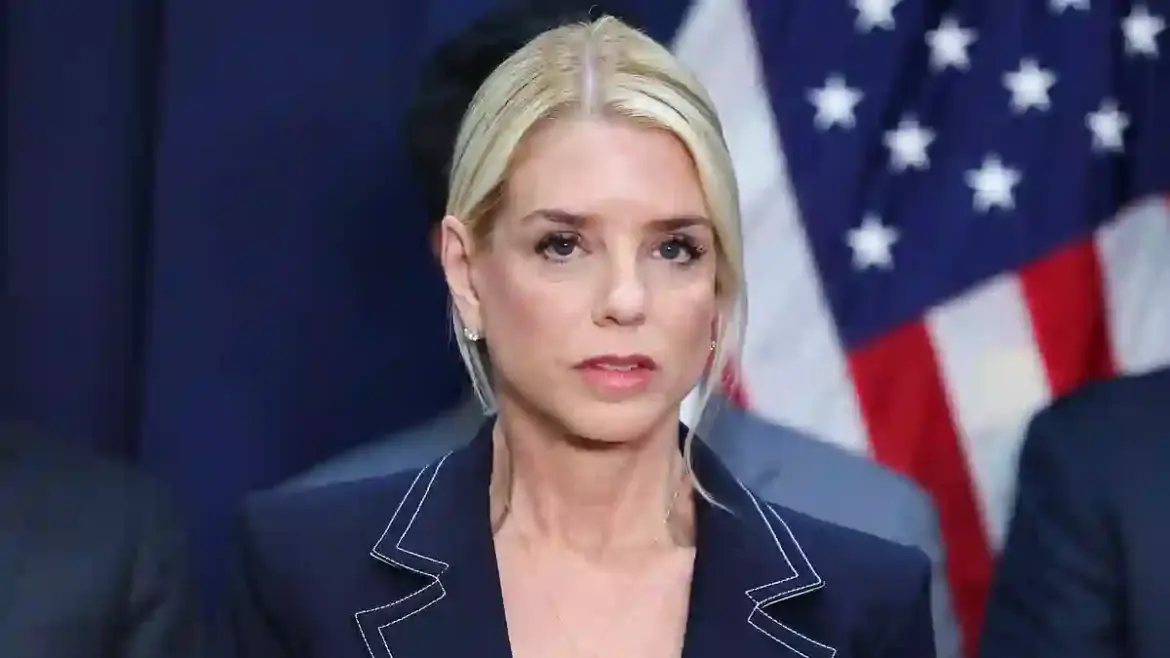The Jeffrey Epstein case continues to send shockwaves through Washington, this time over a tiny detail with huge implications: a single missing minute in prison surveillance footage.
Newly released video from the night of August 9, 2019, at Brooklyn’s Metropolitan Detention Center has raised serious questions about previous explanations from Attorney General Pam Bondi.
The footage, originally released by the Justice Department last July, seemed straightforward—until eagle-eyed viewers noticed it jumped forward one minute just before midnight.
Further scrutiny revealed the clip was pieced together from at least two separate segments using Adobe Premiere Pro. Bondi had previously claimed that the missing minute was a routine quirk of the Bureau of Prisons’ nightly video system, insisting every night showed the same omission.
Oversight Committee Releases the Mystery Minute
In a surprising twist, the House Oversight Committee included the previously “missing” minute in two hours of additional footage released on Tuesday.
This move comes amid a broader investigation into possible ethics violations among elected officials connected to Epstein’s case.
The committee’s release coincided with meetings between lawmakers and survivors of Epstein’s alleged abuse.
The emotional impact on committee members was palpable.
Republican Rep. Nancy Mace was visibly in tears after the briefing, while Florida Republican Anna Paulina Luna acknowledged the scale of the scandal, telling reporters, “This is a lot bigger than anyone anticipated.”
Mace later shared on social media that the survivors’ stories triggered a severe panic attack, leaving her shaking, hyperventilating, and struggling to breathe.
As a recent survivor of sexual assault herself, she said the session underscored “the immense pain of how hard all victims are fighting for themselves because we know absolutely no one will fight for us.”
Pressure Mounts on Trump to Release More Files
The unfolding revelations have put renewed pressure on former President Donald Trump to release additional Epstein-related documents.
Republican Rep. Thomas Massie suggested that Trump may be withholding files to protect personal acquaintances.
Massie appeared alongside Democratic Rep. Ro Khanna on MSNBC’s All In, discussing efforts to compel the Justice Department to release minimally redacted files.
Massie emphasized that the goal isn’t to accuse Trump of wrongdoing but to shed light on “rich and powerful people that are friends of his,” some of whom are actively influencing politics in Kentucky.
The Discharge Petition: Forcing a House Vote
To push for transparency, Massie and Khanna introduced a discharge petition to force a House vote on releasing more Justice Department files.
If they can gather 218 signatures—half of the House—the petition would compel a formal vote.
Both lawmakers have criticized the existing documents from the DOJ, calling them heavily redacted and largely repetitive.
Massie described them to Axios as “a bunch of redacted documents and nothing new,” while many Democrats noted that 97 percent of the 33,000 pages were already public.
What the Documents Reveal
Among the newly released materials are flight logs from 2000 to 2014 detailing Epstein’s travels, transcripts from interviews with Ghislaine Maxwell (his convicted accomplice), and videos of victims recounting their experiences.
Other files include previous releases, such as Deputy Attorney General Todd Blanche’s interviews with Maxwell, videos of Epstein’s West Palm Beach home, and local police audio.
The Daily Mail also reviewed an internal Bureau of Prisons report examining how Epstein could commit suicide, noting an “excessive” number of linens in his cell.
While the report agrees with the FBI’s conclusion that Epstein died by suicide, much of its content had already been reported.
Political Maneuvering in the House
Despite bipartisan support for releasing additional information, GOP leadership may be attempting to limit the impact of these developments.
House Speaker Mike Johnson scheduled a separate vote on a measure instructing the Oversight Committee to “continue its ongoing investigation,” which critics say is largely symbolic.
Massie accused the leadership of using the vote as “political cover” for members who don’t support the bipartisan push to release the full Epstein files.
Looking Ahead: September on Capitol Hill
September promises to be a busy month for Epstein-related investigations.
Survivors are scheduled to hold a press conference with Massie and Khanna, while several high-profile former officials—including Labor Secretary Alex Acosta—are set to meet with the committee.
Acosta, then a U.S. Attorney, helped Epstein secure a plea deal in 2007 that shielded him from federal charges, a deal kept secret from many victims.
Former FBI Director Robert Mueller was also subpoenaed but cannot testify due to health issues, as he has Parkinson’s disease.
Meanwhile, former President Bill Clinton and Hillary Clinton have been subpoenaed for interviews in October.
Additionally, Oversight Committee Chairman James Comer requested Suspicious Activity Reports (SARs) from the Treasury related to Epstein, with a September 15 deadline.
SARs are financial alerts meant to flag potential criminal activity such as fraud or money laundering.
The unfolding investigations, along with the newly released footage and documents, continue to shine a light on the vast network surrounding Epstein, keeping the Capitol on high alert.
